Shimadzu's Response to Dementia
As the lifespan for humans continues to increase, the number of people living with dementia has also increased.
Dementia is a pressing issue that needs to be addressed as it affects not only the person suffering from the disease, but also the person’s family members.
What can we do to create a society in which patients and their families can live in harmony
with each other and maintain their quality of life as they age?
We contribute to solving challenges in society through science and technology to offer a vision for advanced healthcare.
From Ultra-early Diagnostics to Prognosis Management of Dementia
Despite the wide variety of research being conducted around the world to determine the causes and mechanisms involved in dementia, most of that research has not resulted in discovering fundamental therapeutics for treating dementia. It is important to discover dementia early, slow its progression, and mitigate its symptoms. For future research, it is essential that patients get examined as early as possible and that symptoms get diagnosed accurately.
Using Shimadzu’s analytical science and medical diagnostic imaging technologies, we aim to offer new solutions for the entire healthcare cycle, from ultra-early diagnostics and diagnosis to treatment and prognosis.
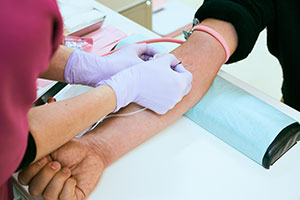
Predicting Amyloid-beta Deposition Levels in the Brain from a Blood Test
Shimadzu is developing technology for predicting the accumulation of amyloid-beta deposition in the brain based on results from using mass spectrometry to measure amyloid-beta quantities in a small amount of blood.
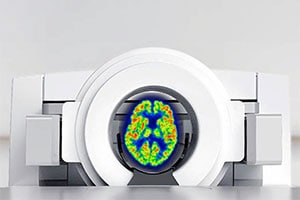
Visualizing Amyloid-beta Deposition in the Brain using PET Imaging
High-performance PET scanning can be used to visualize amyloid-beta deposition in the brain. It contributes to future research of dementia and drug discovery.
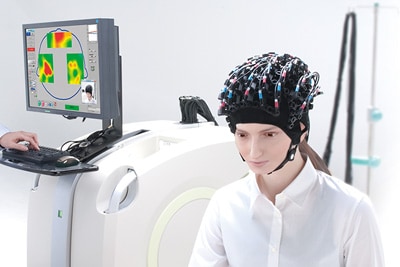
Evaluating Cognitive Function by Optical Brain Function Imaging
Functional near-infrared spectroscopy (fNIRS) can measure cognitive brain activities in a setting similar to daily life.
Early Discovery Is Important for Delaying Disease Onset and Progression
Alzheimer's disease is thought to be caused in part by the accumulation of amyloid-beta, which is followed by nerve cell death and brain atrophy due to abnormal tau protein. It is reported that this degeneration will progress over several decades until the onset.
The longer dementia progresses, the more difficult it is to moderate symptoms. Therefore, to delay the onset and progression of symptoms through lifestyle improvements or medication, signs of amyloid-beta deposition must be discovered as early as possible.
Shimadzu offers a wide range of solutions for the study of dementia with our diverse technologies, which include amyloid-MS for ultra-early diagnostics, PET scanning for diagnosis, and fNIRS for prognosis.
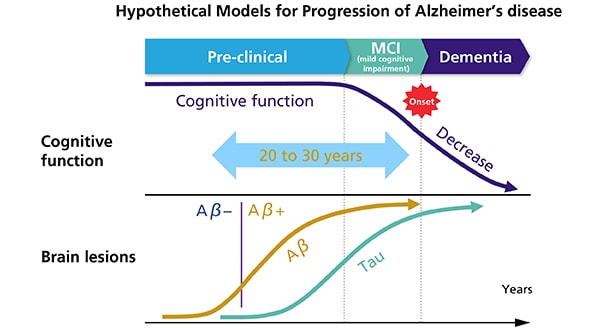
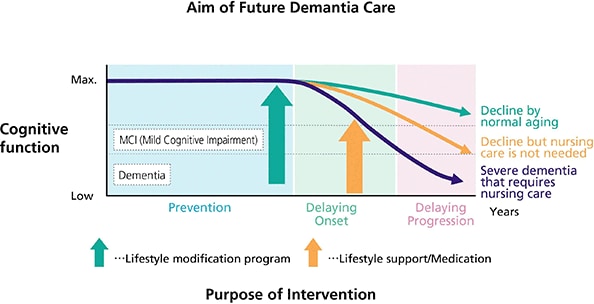
Dementia Is a Healthcare Challenge to be Addressed by All of Society
What Is Dementia?
Dementia is an impairment that involves a decrease in normal memory, thinking, or other cognitive abilities due to an illness or disability in the brain. There are several types of dementia. The most common form is Alzheimer's disease, caused by neurological degeneration as parts of the brain atrophy.
The next most common form is vascular dementia, caused by cerebrovascular impairments, such as cerebral infarctions or cerebral hemorrhages. Many patients have both Alzheimer's disease and vascular dementia as mixed dementia.
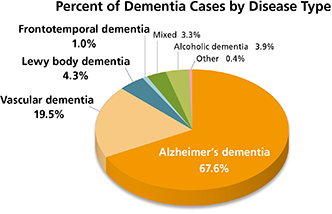
Early Detection/Treatment of Mild Cognitive Impairment
Mild Cognitive Impairment(MCI) has recently attracted attention as a loss of memory or another mental deficiency that is more than normal forgetfulness, but not to the extent of dementia.
If a person’s forgetfulness feels somewhat worse than in others of comparable age, being examined by a specialist as a precaution could result in early detection and early treatment.
Therapeutics for Dementia
Definitive Care Remains a Long Way Off
There are still no established therapeutics that can completely cure dementia. Therefore, the current objective of treatment is to minimize symptoms and slow their progression.
Current therapeutics are either pharmacological or non-pharmacological. Although several drugs are expected to slow progression of the core symptoms of Alzheimer's disease, no drug is currently effective for cerebrovascular dementia. Consequently, most treatment methods involve the use of non-pharmacological therapies to suppress symptoms.
Expectation for Future Therapeutics
In Alzheimer's disease, a substance called amyloid-beta accumulates in the brain and is reported to be related to the degeneration of nerve cells. That's why researchers around the world are rushing to develop therapeutics that prevent amyloid-beta from accumulating.
The development of drugs that safely suppress the accumulation of amyloid-beta plaques is a vital step in the prevention of neurodegeneration caused by Alzheimer's disease. These drugs could potentially stop the progression of dementia. However, once the cells degenerate and die, they cannot regenerate, and the loss of function due to advanced dementia is difficult to restore. Consequently, early detection and early treatment will become increasingly important.
A Key to Prevention of Dementia: Early Detection and Treatment
Now that we are getting closer to having a drug that can inhibit amyloid-beta accumulation, early detection and early treatment of dementia are more important than ever. Given that many cases of MCI are thought to be at a stage where Alzheimer’s disease has not developed yet, presumably it will be possible to prevent Alzheimer’s dementia by starting treatment at that stage.
Source: Japanese Ministry of Health, Labour and Welfare website “Comprehensive Information on Everyone’s Mental Health”
https://www.mhlw.go.jp/kokoro/know/disease_recog.html
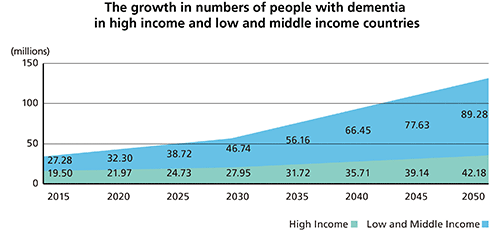
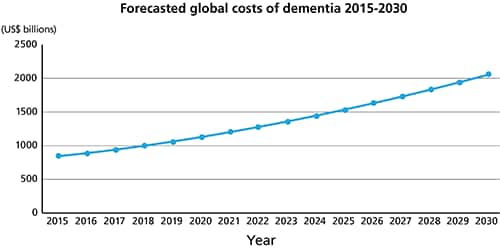
Collaborating with Partners
In order to develop the best possible technologies for each phase and satisfy the needs of actual clinical users,
Shimadzu has been forming partnerships and engaging in joint research with research institutions around the world.
Shimadzu collaborated with the Australian Imaging Biomarkers and Lifestyle Study of Ageing (AIBL), the National Center for Geriatrics and Gerontology in Japan, and others to establish a blood-based assay using a mass spectrometry system for early detection of Alzheimer’s biomarkers discovered by Shimadzu.

Shimadzu joined the National Center for Geriatrics and Gerontology and others in a research group to start a multi-facility industry-academia collaboration for developing a system capable of comprehensive layer-specific analysis of dementia based on biomarkers in blood (BATON project). Our intention is to develop and commercialize a system that can diagnose dementia, and predict the risk level of dementia in people without symptoms of dementia.
Developing Technology for Current and Future Challenges

Our technology is used in the research and development of ultra-early diagnostics, diagnostics, medical treatment, and prognosis phases to overcome diseases, such as cancer and lifestyle-related illnesses, and achieve healthier, longer life expectancies.







